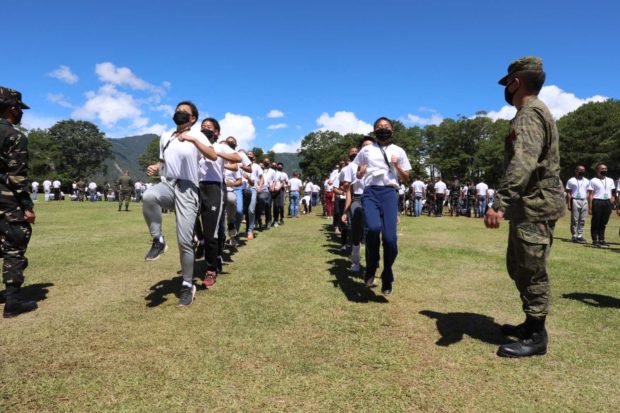
MASKEDENDURANCE These plebes went through exercises after setting foot at the Philippine Military Academy (PMA) on June 15, 2020. —PMA PHOTO
BAGUIO CITY—The scheduled arrival of the 350 new cadets of the Philippine Military Academy (PMA) at the campus on Tuesday has been delayed by strict health requirements, an official of the country’s premier military school said on Sunday.
The PMA freshmen, or plebes, must complete their mandatory quarantines, as well as with the health guidelines required before they leave their respective homes and enter Baguio, said Air Force 1Lt. Christine Mae Calima, PMA spokesperson, in an interview.
She said the plebes were required to go to the nearest central Army facility in their areas for their 14-day quarantine. The health requirements included mandatory physical examinations and a negative result for the reverse transcription-polymerase chain reaction (RT-PCR) test.
The incoming plebes would make up PMA Class of 2025, the second batch of plebes to join the Corps of Cadets during the coronavirus pandemic.Tuesday would have been the first day when these plebes would set foot inside the military campus to undergo four years of academic and military training.
Physical, mental tests
The 30-minute reception rites would usually require the plebes to undergo fast-paced physical activities such as pushups, quick roll and sit exercises and racing across the Borromeo Field each time new instructions are barked out by senior cadets.
The ritual tests their physical and mental endurance, and provides an avenue for aspiring cadets to withdraw without any form of recrimination.
Calima said a new reception date has yet to be determined.
Last year, the 310-strong Class of 2024 stepped into Fort Del Pilar for the first time on June 15 after they completed the 14-day quarantine. At the time, PMA had already placed itself on a lockdown.
But even their strictest protocols failed to prevent more than 50 cadets and 20 other PMA occupants from contracting COVID-19, which was detected through aggressive testing toward the end of 2020 and the start of 2021.